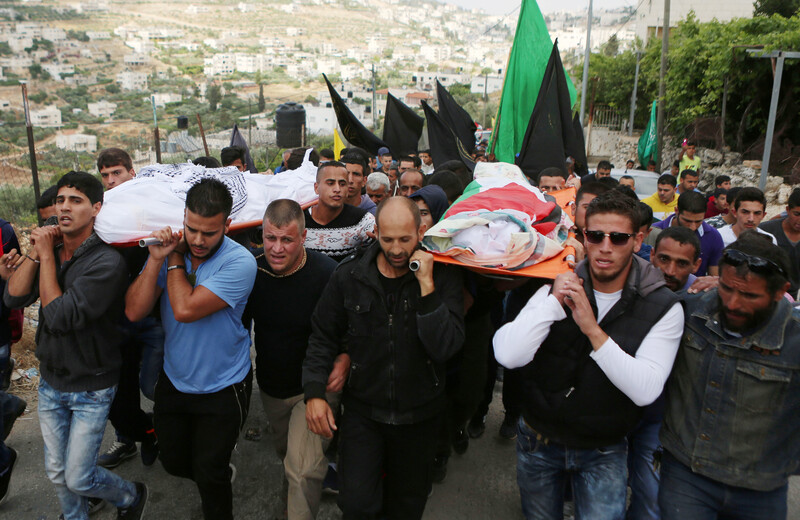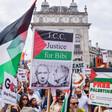Rights and Accountability 24 May 2016
Israeli forces shot and killed a 19-year-old Palestinian woman at a checkpoint north of Jerusalem on Monday.
An Israeli police spokesperson claimed that the woman had allegedly attempted to stab a soldier at the checkpoint and another soldier shot the woman, who died at the scene. No Israelis were reported injured during the incident.
The woman was identified as 19-year-old Sawsan Ali Dawud Mansour.
A photograph of Mansour circulated on social media after her slaying:
More than 200 Palestinians have been killed, as well as 28 Israelis, two Americans, a Sudanese national and an Eritrean asylum-seeker since the beginning of October last year, when a new phase of direct confrontation between Palestinians and Israeli forces broke out.Twenty-six Palestinian children are among those slain.
The majority of Palestinians were killed during what Israel alleges were attacks, though in many cases, eyewitness testimony and video footage shows Palestinians were shot dead when they posed no immediate threat in what may amount to extrajudicial executions.
Though the deadly violence has ebbed in recent months, Israeli forces killed 36-year-old Riyad Shehadeh near the occupied West Bank village of Beitunia after he allegedly ran over and injured three soldiers on 3 May.
A brother of the slain man condemned the killing as an “execution,” saying that Shehadeh could have been detained instead of shot dead.
Witnesses told the Ma’an News Agency that it appeared Shehadeh hit the soldiers by accident. He fled the scene in his vehicle and was pursued and ultimately blocked by Israeli forces who had erected a separate barrier further down the road.
“Israeli soldiers at the checkpoint fired several rounds at the driver, then they pulled him out of the truck and fired at him again, witnesses said,” Ma’an reported.
Palestinian emergency medics were prevented from treating Shehadeh, who was left to bleed to death, witnesses told Ma’an.
Slain siblings buried
A pregnant woman and her 16-year-old brother were shot dead at the Qalandiya checkpoint between Ramallah and Jerusalem in late April.
The bodies of Maram Salih Hassan Abu Ismail, a mother of two, and Ibrahim Taha were transferred by Israel on Monday and buried by their family.
Israel claimed the pair were killed during an attempted attack on soldiers, but eyewitnesses disputed this version of events.
The Israeli human rights group B’Tselem said the siblings “were killed without any justification, when they clearly no longer posed mortal danger and could be stopped without killing them.”
An Israeli military probe into the incident was reportedly dropped after it was found that the brother and sister were killed by civilian security guards at the checkpoint.
“To date, the police has refused to grant requests by the media and members of Knesset [Israel’s parliament] to publish footage of the incident recorded on the security cameras installed at the checkpoint,” B’Tselem stated earlier this month.

Mourners carry the bodies of Maram Abu Ismail and Ibrahim Taha during their funeral near the West Bank city of Ramallah on 23 May.
APA imagesIn this instance, like in dozens of others, “Israeli medical teams … refrained from providing medical treatment to the casualties, while Israeli security forces … prevented Palestinian teams from providing care,” according to B’Tselem.
In recent days Israel transferred the bodies of several other Palestinians slain during alleged attacks and which were withheld for months.
At around midnight Monday, the remains of Hasan Manasra, 15, and Alaa Abu Jamal, 32, were handed over to their families in Jerusalem for burial. The families were required to pay deposits of thousands of dollars to ensure they met the conditions imposed by Israel for immediate nighttime burial attended by only 40 persons.
Israeli forces were deployed in large numbers during the Jerusalem funerals.
Manasra was shot and killed and his 13-year-old cousin, Ahmad, was run over by a car and seriously injured after they allegedly stabbed and wounded a teenager and a man in an Israeli settlement in occupied East Jerusalem last October.
Ahmad Manasra, now 14, has since been convicted by an Israeli court on two counts of attempted murder and faces a maximum 20 years in prison.
Those who attended the funeral told Ma’an that “Israeli troops inspected them thoroughly and seized their mobile phones before they were allowed into the cemetery.”
Abu Jamal was fatally shot in October after he drove into a bus stop in West Jerusalem and began attacking those he hit with a meat cleaver. Yeshayahu Krishevsky, a 59-year-old rabbi, was slain during the incident.
Minister orders halt on body transfers
Following the funeral for Abu Jamal, the Israeli minister who issued the order in October to withhold the remains of slain Palestinians decided once again to suspend the return of bodies after seeing footage of a large number of people gathered around the cemetery where Abu Jamal was buried.
Ma’an reported that minister Gilad Erdan accused the crowd of “incitement.”
Israel continues to withhold the bodies of approximately a dozen Palestinians killed since October.
Earlier in the day on Monday, Israel returned the body of Fuad Abu Rajab, 21, who was shot and killed in East Jerusalem after firing gunshots at Israeli police, wounding two.
On Sunday, Palestinians in the village of Hajja near the West Bank town of Qalqilya buried Bashar Masalha, 22, nearly three months following his slaying after he stabbed and killed a US tourist and wounded several others in the coastal city of Jaffa in present-day Israel.
Videos of the scene recorded on mobile phones show Masalha running along a boulevard before he is shot multiple times. The footage suggests that Masalha may have been killed by a bullet fired at him while he was lying on the ground, apparently subdued.
The bodies of a Palestinian woman and a teenage boy were returned to their families in Jerusalem last week.
Fadwa Abu Teir, 51, and Mutaz Uweisat, 16, were killed on 8 March and 17 October, respectively, during alleged stabbing attempts on Israeli forces. No Israelis were seriously injured in either incident.
The family of Uweisat petitioned Israel’s high court earlier this year to demand that the police order an autopsy on the boy’s remains. The family previously rejected Israel’s condition to immediately bury the boy’s body upon transfer, as it would prevent an autopsy.
Executions
In March, video footage showed an Israeli soldier shooting at the head of a wounded Palestinian man as he lay on the ground in the West Bank city of Hebron. The Palestinian man, Abd al-Fattah Yusri al-Sharif, 21, died from the wound to his head. Also killed in the incident was Ramzi Aziz al-Qasrawi, 21.
Israel alleges the two attempted to stab soldiers, injuring one, but the Palestinian rights group Al-Haq called the slaying of the Palestinian youths war crimes.
Elor Azarya, the soldier who shot al-Sharif in the head, is now being tried for manslaughter.
Israel’s defense minister Moshe Yaalon fell out with Prime Minister Benjamin Netanyahu in the wake of the Hebron incident and last week Yaalon announced his resignation and temporary withdrawal from public life.
Set to take his place is Avigdor Lieberman, the head of the ultra-right-wing Yisrael Beiteinu party, who seeks to introduce death sentences for convictions of “murder in a terror act” prosecuted in military courts – courts reserved almost exclusively for Palestinians living under Israeli military rule.
Israelis charged with similar crimes are prosecuted in civilian courts.
Yet as B’Tselem has noted, Israel is already carrying out executions, “without the benefit of law or trial.”
The encouragement by Israel’s top leadership of a “public mood that considers ‘shooting to kill’ valid in all cases and circumstances, even when the suspect no longer poses any danger,’ has transformed soldiers, police and armed civilians into ‘judge, jury and executioner,’” according to the group.
Tags
- Sawsan Ali Dawud Mansour
- extrajudicial executions
- Riyad Shehadeh
- Maram Salih Hassan Abu Ismail
- Ibrahim Salih Hassan Taha
- Hasan Khalid Manasra
- Alaa Abu Jamal
- Ahmad Manasra
- Fuad Abu Rajab
- Bashar Masalha
- Abd al-Fattah Yusri al-Sharif
- Ramzi Aziz al-Qasrawi
- Elor Azarya
- Moshe Ya'alon
- Avigdor Lieberman
- B'Tselem






Comments
Yet another lynching by the Empire's Torah Desecrators
Permalink Zionism Is Not Judaism replied on
Criminal imperialism and racist Zionism murder another victim. RIP Sawsan Mansour.
Jim Crow in Palestine must go.
No Equality, No Peace!